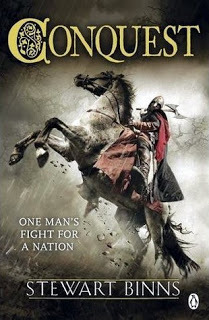An interview with Stewart Binns, author of Conquest
 Today Stewart Binns is visiting the blog to respond to some questions about his new novel Conquest, fast-paced adventure fiction about Hereward of Bourne – or Hereward the Wake, as he's better known. A legendary English hero whose existence is historically documented, Hereward led the resistance to the Normans' conquest of England in the landmark year of 1066. The principal story of Conquest, however, begins thirteen years beforehand. A strong and impetuous young man of eighteen, Hereward is a brilliant fighter who still has much to learn about the ways of the world.
Today Stewart Binns is visiting the blog to respond to some questions about his new novel Conquest, fast-paced adventure fiction about Hereward of Bourne – or Hereward the Wake, as he's better known. A legendary English hero whose existence is historically documented, Hereward led the resistance to the Normans' conquest of England in the landmark year of 1066. The principal story of Conquest, however, begins thirteen years beforehand. A strong and impetuous young man of eighteen, Hereward is a brilliant fighter who still has much to learn about the ways of the world.Conquest was the first major novel about Hereward the Wake to appear in quite a while, and there have been several other authors writing about the tumultuous events of 11th-century England just within the last year, too. What attracted you to this time period, and why do you think readers are so interested in it now in particular?
I've always been fascinated by 11th century England and 1066 in particular. I think Senlac Ridge was the critical defining moment in English/British history where the outcome determined the kind of country England became and all that led from it: Britishness, Anglo-American (western) culture etc. It was a great battle in every sense: its consequences, its intensity, its protagonists and the fact that the margin between defeat and victory was so close. Hardrada and Stamford Bridge are part of this as well, and I've always been intrigued by the mix of Celt, Norse, Norman and Anglo-Saxon at the time and how different England and the modern world would have been if either Harald, or Harold had emerged victorious instead of William.
Hereward is an enigmatic figure with wonderful William Wallace-like hero potential, and I thought he was the perfect character to build both an heroic adventure around and to tell the story of those amazing times.
I think there is growing interest in English history at the moment as the English try to define themselves afresh in a newly-devolved Britain. Now that the Scots, Welsh and Irish are off doing their own thing, 'Britain' no longer exists in the way the English defined it, as, effectively, 'Greater England'. The English tended to define 'English' as 'British' and that doesn't work anymore, leaving the English in search of themselves and their past.
The novel is framed around Godwin of Ely's account of his earlier life in England. What made you decide to write the core of the novel in third person rather than first?
I suppose I wanted there to be a circle from The Old Man of the Wildwood and Godwin of Ely and for Hereward to survive into great old age. The Varangian Guard/Byzantium/John the Beautiful were irresistible as well. However, my biggest challenge was how the deal with William would work at the end of the Siege of Ely. Thus, the anonymity clause and the creation of Godwin. There are also factors at play that make book 2 work! (To be published next April).
In working through the material on Hereward's life, how did you decide which elements to take from the myths about him, and which from history?
I only took the bits that seem fairly substantial – the banishment and Ely, the rest is fiction. However, although the book is of course fiction, all the history is spot on in terms of main characters, events and chronology. That is really important to me.
Hereward's wife Torfida (or Torfrida) was a character in Charles Kingsley's 1865 novel about him, but was there any mention of her in other novels, or in history, before he wrote about her? How did you develop her character?
I slightly changed her name (by accident rather than design!) but she is mentioned in the 12th century Gesta. I wanted a strong female character, slightly mysterious and somewhat tragic. It is also mentioned that they had twins.
During his time as a mercenary, Hereward and his company travel throughout many parts of Britain and Europe - Ireland, Scotland, Scandinavia, Sicily, the Alps, France, and elsewhere. Did you get the chance to visit any of these sites yourself?
I have a policy only to write about places I've been to and can visualise. I'm lucky, I've travelled a lot!
The novel's action scenes certainly feel very realistic! What was your most enjoyable battle scene to write?
I'm told I write battles well. Two reasons I think: My day job is as a documentary-maker, so I suppose I think in pictures. Also, as an ex-soldier, I know how they think.
Most enjoyable battle scene to write - Senlac Ridge of course – one of the most important battles in world history. I really enjoyed trying to explain how it might have happened, especially the astonishing bravery on both sides. I'm also quite fond of Ely. There is no known detail of what happened there, so an author's paradise!
What do you hope readers get out of reading Hereward's story?
Superficially, a good action/adventure romp through a great period of history and beneath that some thoughts about good and evil, right and wrong, truth and myth; some questions about courage and sacrifice and beneath those a little thesis about the making of England.
Conquest was published in February by Penguin UK at £6.99 (pb, 497pp).
Published on July 25, 2011 22:00
No comments have been added yet.



